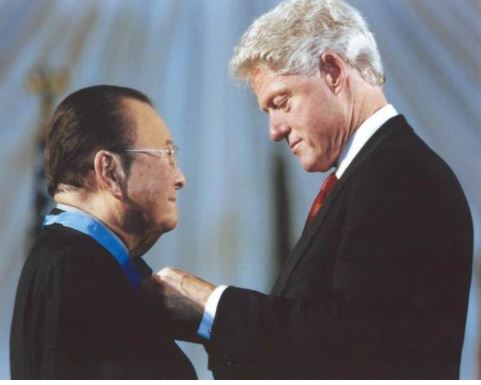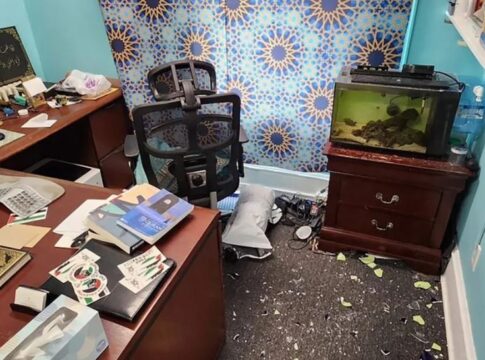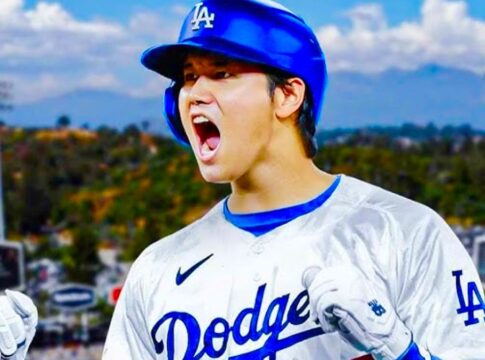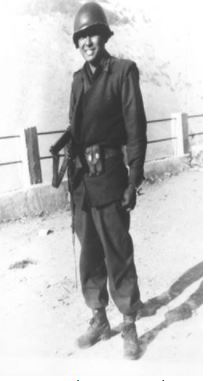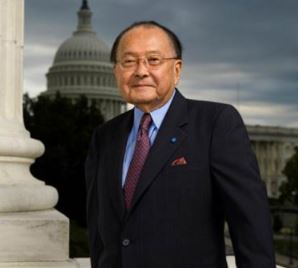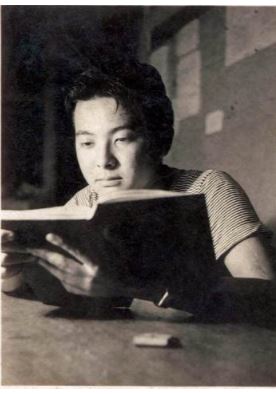Photo from Daniel Ken Inouye Institute
By Raymond Douglas Chong, AsAmNews Staff Writer
During World War II, on April 21, 1945, at an Italian river valley, Japanese American soldiers were fiercely fighting German enemies. A young lieutenant led his platoon to successfully assault the enemy lines. But a rocket grenade scattered his right arm and destroyed his American dream to be a surgeon.
Sixty-five years later, on June 28, 2010, the American Dreamer became President pro tempore of the United States Senate. He was third in the Presidential line of succession. And the highest-ranking Asian public official in America.
Life of The American Dreamer
The Honorable Daniel Ken Inouye was born on September 7, 1924, in Honolulu, Territory of Hawaii. He grew up there and graduated from McKinley High School. He dreamt to be a surgeon
LATEST STORIES
During the Japanese attack on Pearl Harbor on December 7, 1941, Inouye served as a medical volunteer to treat injuries. He enrolled in the pre-med program at University of Hawaii, where he studied until 1943.
Inouye served in the United States Army in the famed 442nd Regimental Combat Team. It was a segregated fighting unit of Japanese Americans. They fought in the European Theatre with a spectacular combat record. At an Italian battlefield, Inouye was severely wounded.
After recovery from his war wound, Inouye earned a bachelor’s degree in political science from University of Hawaii. Then, he earned a law degree from George Washington University.
My first thought was that I could no longer play the ukulele, and my dream of becoming a surgeon was over. But it is a funny thing — I never considered myself a cripple or an invalid. It just never became part of my thinking. It is not part of my thinking today.
– DANIEL KEN INOUYE
From “Journey to Washington” book, 1967.
From 1953 to 1959, he served in the Hawaii Territory legislature. After its statehood, in 1959, voters elected him to the United States House of Representatives and in 1962 to the US Senate where he served for 49 years.
Inouye was widely respected as a man of bipartisan integrity in the Senate. He was a shrewd champion of the interests for Hawaiians at the federal level. He was an impassioned advocate of civil rights for peoples of color. He was a staunch defender of national security and military families and veterans.
Laws cannot change the hearts of men, and we will not change the hearts of men by this law if indeed we are able to enact it.
Yet, I do not believe America will fall now or in the future, and I further believe this one great infirmity, this inconsistency in our national character and in our view of ourselves will in time be healed. Although the new law is not a solution, it is part of the solution and it is the part that we, the lawmakers, are responsible to provide. The rest must be provided in the churches, in the schools and in the consciences of the people. It is time for all Americans to be included in the American dream.
– DANIEL KEN INOUYE
Statement in support of the Civil Rights Act of 1964, Senate floor, 1963.
Americans recognized his sterling service on the Watergate Committee, from 1973 to 1974, and on Iran-Contra Investigative Committee, 1987.
The involvement of the President of the United States in criminal activities and the subsequent pardon of that President even for well-intentioned reasons does not teach a fitting moral lesson to our youngsters. The apparent lesson is that there is a double standard of justice—one for the rich and powerful and one for the poor and powerless.
Although we cannot erase the sequence of Watergate events, we need not encourage our children to accept public corruption as inevitable.
– DANIEL KEN INOUYE
Speech delivered to Hawaii Parent-Teacher Association, 1974.
On December 17, 2012, Senator Daniel Ken Inouye died in Maryland. He’s he awarded the Medal of Honor by President Bill Clinton and Presidential Medal of Freedom by President Barrack Obama.
Ken Inouye
Daniel “Ken” Inouye Jr. is the son of Senator Inouye and his late wife Margaret Shinobu Awamura. Ken was a guitarist with the hardcore punk band – Marginal Man. Now, in Hawaii, he perpetuates the legacy of his father, with The Daniel Ken Inouye Institute. It preserves Senator Inouye’s papers and tells his life story.
Interview with Ken Inouye
RAYMOND DOUGLAS CHONG Why is the Senator a positive role model for all Americans?
KEN INOUYE I believe that he is a positive role model for all Americans because in many ways he exemplifies the American dream. He was always quick to point out that he came from an immigrant family who came to Hawaii to labor in the sugarcane fields. His family was not very well off and endured a lot of economic hardships. I remember him telling me stories about how they would slice a hardboiled egg six ways so everybody in the family got a piece. During World War II he and his family were classified as enemy aliens. In spite of all these setbacks, he was able to be elected to the Senate and rise to a position third in succession to the presidency (President Pro Tempore). He would always point to that and say that this story is only possible in America, and that almost anything is possible if you work hard and dream big.
RAYMOND DOUGLAS In your view, what were his achievements and highlights as Senator?
KEN INOUYE I will be candid with you. I know a lot of people who if asked this question would likely start citing any number of specific legislative initiatives he helped shepherd through the legislative process. Having said that, and with a full understanding that he worked on many pieces of legislation that were highly significant, I feel that his greatest accomplishment as a senator was his ability to be bipartisan and have very close friends and confidants on both sides of the aisle. I especially feel this to be the case during this current time, a time during which we find ourselves in the thick of one of the most partisan periods in our history.
My father had a very keen understanding that in order to get something done you needed to have support from both sides of the aisle, as well as from multiple constituencies. He felt very strongly about working in a bipartisan fashion. He would always tell me when I was growing up that great ideas never happen in a vacuum. They are only able to happen through input from multiple voices representing a variety of backgrounds and experiences.
RAYMOND DOUGLAS CHONG What are the American principles (external) and values (internal) of the Senator?
KEN INOUYE I believe that my father is an example of what is possible in America when one has a strong work ethic. I also believe that he exemplifies the concept of America as being a nation of immigrants, and that these immigrants come to America in hopes of bettering their lives. The concept of the “American dream“, the belief that if you work hard you can move up in American society, is something that some have come to challenge and doubt. Having said that, the fact that the concept of the “American dream“ exists and continues to be something that Americans try to nurture and preserve, helps it continue to be viable. He would often point out that in spite of his many setbacks, such as systemic racism and the fact that he and his family were classified as enemy aliens during World War II, he was able to be elected to the Senate and rise to become President Pro Tempore, a position third in succession to the presidency. He would often point to that and say that this story is only possible in America and that almost anything is possible if you work hard and have big dreams.
RAYMOND DOUGLAS CHONG How was your father an advocate for Asian Americans?
KEN INOUYE I feel that he was an advocate for Asian Americans in two ways. One way is by showing America at large that Asian Americans are above all, Americans. He showed that Asian Americans are just as American as every other group that has come to this country. At the same time, he served to show Asian Americans not to feel held back by the fact that they are Asian. In fact, they should feel empowered by their Asian background. Do not shrink from that background, but rather draw your inspiration and strength from it.
RAYMOND DOUGLAS CHONG Did your father ever expressed bitter regrets about American racism or his wound?
KEN INOUYE He did not. Having said that, he definitely made it clear to me that in the days immediately following getting wounded that he felt quite bitter. After all, he was pre-med and planning to go to medical school and become a surgeon after the war. Having lost his arm, that dream went up in smoke. After feeling sorry for himself for a time, he realized that the only way he was going to get through the process of recovering from his wounds was to understand that he was the master of his own destiny. In other words, nobody was going to get him through this, he had to get himself through the process of recovery and healing. Once he made that realization, he stopped being bitter about his injury, and instead became focused on his recovery and his goals. He and others who fought in the 442nd felt that too many lives have been lost and too much blood had been shed to go back to the same world and the same discrimination that they left behind. It was at this point that he decided that he wanted to work towards the goal of entering politics.
RAYMOND DOUGLAS CHONG Did your father share his experiences during World War II?
KEN INOUYE He did. He began sharing his experiences during the war quite early in my life, when I was about five or six years of age. He was very clear about what his life was like during war time. He also was quite graphic in his descriptions and did not hold back how ugly war is. He made it very clear that the way war is portrayed in the movies is nothing like it is in real life. He always made clear that war is a very ugly undertaking; people die, people get hurt, and the ripple effects from wartime carnage affect many people beyond just those who did the fighting. As a result, he felt that society overall did not take war seriously enough. For example, he felt that war toys, toy guns, toy soldiers, etc. served to trivialize war and everything that’s involved in it. As a result, when I was growing up I never had any war toys, no toy guns, no toy soldiers, nothing like that. He was very serious about that.
RAYMOND DOUGLAS CHONG Describe your family life behind the scenes.
KEN INOUYE Our family life was relatively normal. This is largely due to the long-standing policy that my mother and father had regarding my father’s work. Once my father got home, there was to be no discussion about his work, unless he brought it up. If he did not bring it up, there was to be no discussion of his work. However, if he brought it up then his work was open for discussion. As a result, he was very present and in the moment during his time at home. During his time at home, family matters got the same amount of energy and focus as his work did during his time in the office.
RAYMOND DOUGLAS CHONG What are your favorite memories of your childhood with your father?
KEN INOUYE It is really hard to narrow that down. Pretty much any time that I spent with him was fairly special. This was in large part due to the fact that whenever he was around, he made it a point to be especially “present“. It wasn’t a matter of just being physically there,. If he was there, he was very much present and in the moment. I saw a lot of movies with him, and he always made it a point to go somewhere after the movie so that we could talk about what we had just seen. He looked at every movie as being a conversation starter and a jumping off point that would allow discussion on any number of topics. There were a lot of conversations about values, ethics, motivations of what makes people do certain things, as well as how minority groups and other marginalized populations are portrayed in entertainment and the media. Such conversations forced me to really look at entertainment and media as not just entertainment and information and prompted me to consider what message or editorial direction the maker of the programming may have had.
RAYMOND DOUGLAS CHONG What are life lessons you have learned from your father?
KEN INOUYE There are many life lessons I have learned from him. However, there are two that stand out.
The first is persistence. He would always tell me that nothing of any value is easy to accomplish. As a result, you have to be prepared for setbacks and you have to be prepared to work hard at whatever undertaking you pursue.
The second is the importance of always treating people with dignity and respect. You only get treated with respect yourself if you treat others similarly. He also always taught me to be very attentive to how those around you treat others. One thing that he used to always tell me was whenever you have a business meeting at a restaurant, watch how everyone at the table treats the wait staff. If they treat the wait staff poorly and with little or no respect, that’s how they will be treating you in a few months.
RAYMOND DOUGLAS CHONG What is the importance of the Daniel Ken Inouye Institute?
KEN INOUYE The Institute is important in that it helps to ensure that my father story will be told, and the future generations will learn about who he was and benefit from the lessons of his life.
Legacy
As an American Dreamer, Senator Daniel Ken Inouye has left an indelible legacy for all Americans.
People have asked me how I want to be remembered and I say very simply that I represented the people honestly and to the best of my abilities. I think I did okay.
– DANIEL KEN INOUYE
Letter to Governor Neil Abercrombie, dated December 17, 2012, the day of Inouye’s death.
AsAmNews has Asian America in its heart. We’re an all-volunteer effort of dedicated staff and interns. Check out our new Instagram account. Go to our Twitter feed and Facebook page for more content. Please consider interning, joining our staff, or making a financial contribution to support us.

